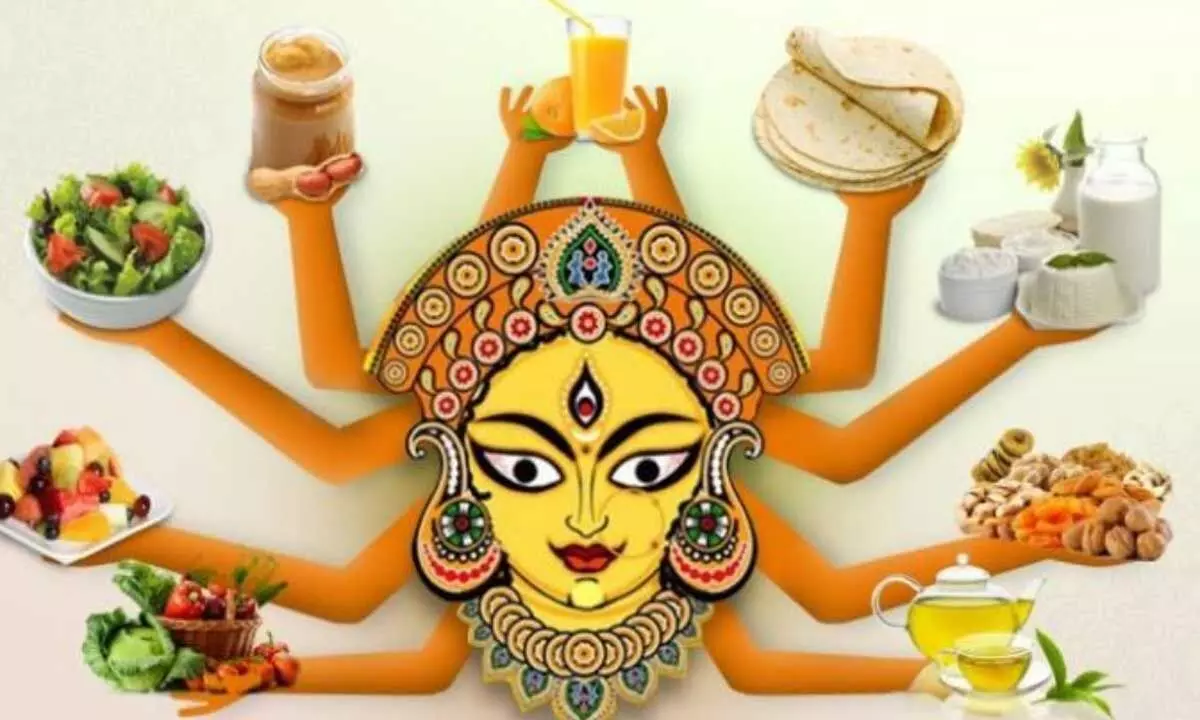Navratri 2024: Fasting Guide – What to Eat and Avoid During the Nine-Day Festival

Navratri is a revered nine-day festival dedicated to honouring the nine avatars of Goddess Durga. It is a time of deep devotion, vibrant celebrations, and various rituals. During this period, many devotees observe fasts as a spiritual practice. Some follow a Sattvic or vegan diet, while others fast each day and break it after worshipping the Goddess. Navratri 2024, observed from October 3 to October 12, culminates with Dussehra, also known as Vijaya Dashami.
As you prepare to participate in Navratri, here's a guide to what foods you can consume and what you should avoid during the fasting period.
Foods to Eat During Navratri Fasting
Alternative Flours for Fasting
Regular wheat is typically avoided during Navratri fasting. Instead, devotees can opt for buckwheat flour (kuttu ka aata), water chestnut flour (singhare ka aata), or amaranth flour (rajgira ka aata) to prepare rotis, parathas, or other dishes.
Fasting-Friendly Rice Substitutes
Those who prefer rice can switch to barnyard millet (samvatke chawal) to make dishes like khichdi, dhokla, or kheer, which are ideal for fasting.
Sabudana (Tapioca Pearls)
Sabudana is another popular ingredient during Navratri. It can be used to make dishes such as khichdi or vadas.
Fruits and Dairy
Fruits are a staple during Navratri fasting, with some devotees choosing to survive solely on fruits and milk for the entire nine days. Dairy products like milk, yogurt, and paneer are also allowed during the fast.
Rock Salt (Sendha Namak)
Normal table salt is not consumed during Navratri fasts. Instead, rock salt (sendhanamak) is used to prepare fasting meals.
Permitted Spices
Cumin, cumin powder, black pepper, green cardamom, cloves, cinnamon, tamarind, ajwain (carom seeds), and nutmeg are some of the spices that are allowed while fasting.
Vegetables for Fasting
Certain vegetables, such as sweet potatoes, arbi (taro root), pumpkins, cucumbers, spinach, and carrots, are commonly consumed during the fast.
Nuts and Seeds
Protein-rich nuts, seeds, and berries are great energy boosters for fasting. Popular options include dates, almonds, pistachios, flax seeds, chia seeds, sunflower seeds, and walnuts.
Foods to Avoid During Navratri Fasting
Prohibited Grains and Flours
Lentils, rice flour, cornflour, maida (all-purpose flour), semolina, and legumes should be avoided during fasting.
Onion and Garlic
Foods prepared with onion and garlic are strictly avoided as they are considered tamasic in nature, which is discouraged during Navratri fasting.
Non-Vegetarian Food
Meat, eggs, and any form of non-vegetarian food are strictly prohibited during Navratri.
Fast Food and Processed Foods
Junk food, processed, and canned foods should be avoided during the fast. It is essential to consume fresh, home-cooked meals.
Alcohol and Smoking
Alcohol, aerated drinks, and smoking are strictly forbidden during the fasting period.
Fasting Tips for Navratri
Instead of having large meals, it is recommended to eat smaller, frequent meals throughout the day to maintain energy levels. Keeping hydrated and incorporating a balanced diet of fruits, dairy, and nuts can help sustain strength during the fast.
By adhering to these guidelines, devotees can ensure a healthy and spiritually enriching fasting experience during Navratri 2024.


